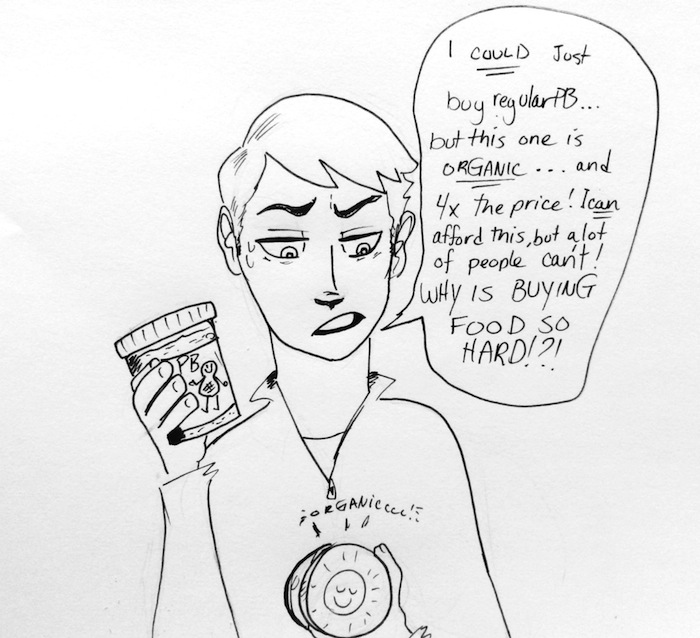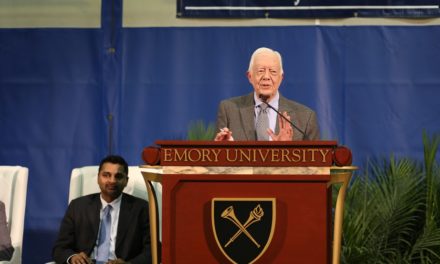Take a walk around Emory’s campus on a typical day, and you’ll find many signs of a community that values sustainability, and in particular, sustainable food. You might stroll through the Emory Farmers Market on a Tuesday, see placards indicating Georgia-grown vegetables in the Dobbs University Center (DUC) salad bar or stop to admire the ripening tomatoes in one of Emory’s Educational Gardens. All of these sights point to Emory’s commitment to sustainability, or meeting our current social, economic and environmental needs in a way that preserves the future generations’ ability to meet their own needs. One of the main ways that Emory addresses this challenge is through sustainable food. While sustainability in regards to our food choices is a critically important issue, it often overshadows another, equally vital issue: food security. Too often, food security receives little attention on campus, and when it is discussed, it is framed as separate from sustainability. However, sustainable food and food security are in fact inextricably linked, and if the Emory community wants to be a leader in sustainability, we must learn to view these social justice issues as two sides of the same coin and address them as such.
Of course, sustainable food as it is usually framed at Emory is undeniably important. The choices we make regarding what we eat, where it’s produced and how it’s prepared are intimately linked to sustainability. Countless resources, from water for grains and antibiotics for cattle to plastic for packaging and oil for transportation, go into our food. This means that the production, transportation and preparation of food have enormous environmental impacts. In many cases, large-scale agricultural operations contribute to water pollution, habitat loss, carbon emissions, erosion and a host of other environmental problems.
However, fundamentally unsustainable food systems are not the only option. The sustainable food movement, which has gained significant traction at Emory, addresses the challenge of ensuring the availability of sufficient nutritious food while avoiding the negative environmental impacts of its production. As defined by Congress in the Food, Agriculture, Conservation and Trade Act of 1990, also known as the Farm Bill, sustainable food satisfies human nutritional needs, preserves environmental quality, uses resources efficiently, supports farm viability and improves quality of life for the broader society. Recently, Emory made a commitment to sustainable food, aiming to serve 75 percent locally or sustainably produced food on campus by next year.
However, Emory’s laudable commitment to sustainable food ignores food security. The U.S. Department of Agriculture (USDA) defines food security as “access by all people at all times to enough food for an active, healthy life.” Food security is by no means a reality in the U.S.; the USDA reports that over 23 million Americans live in food deserts, which are areas lacking reliable access to fresh, healthful, low-cost food. Poverty, outdated transportation networks and the absence of supermarkets and groceries in low-income neighborhoods all contribute to food insecurity. In Atlanta, many neighborhoods are classified by the USDA as food deserts; by one estimate, approximately 30 percent of Fulton County residents live in a food desert.
These two issues, sustainable food and food security, are inextricably linked. If people have access to food that both satisfies their caloric needs but is yet over-processed, nutrient-poor and environmentally destructive, is it truly enough for “an active, healthy life?” If a food system, though organic and local, leaves some community members hungry, is it really sustainable?
A holistic view of food insecurity and sustainable food suggests that in both cases, the answer is no. The USDA’s definition of food security and the Farm Bill description of sustainable food clearly indicate that a steady supply of food does not necessarily equate to food security or sustainability. If the only food available does not satisfy human nutritional needs, it does not enable people to enjoy “active, healthy” lives and therefore is neither secure nor sustainable. In the same way, even if food is nutritious, organic and locally grown, if it is unavailable to many community members, it fails to improve the quality of life for the broader society and as such is by definition neither sustainable nor part of a secure food system. Additionally, a more in-depth examination of both concepts leads to the conclusion that agricultural systems which pollute water and air and contribute to climate change and destroy habitats, impede communities’ abilities to thrive, and thus compromise the active, healthy lifestyles that are essential to the definition of food security. Similarly, monocultures, which produce massive quantities of inexpensive food but are vulnerable to crop failures as a result of plant homogeneity, cannot be deemed secure nor sustainable, as they are liable to collapse at any point, leaving millions of people hungry.
Clearly, food access and sustainability cannot be tackled separately. Often, food insecurity is assumed to be simply a lack of food, which could be remedied through production of greater quantities of less expensive food. Similarly, when unsustainable food systems are viewed as an isolated problem, it would appear that the answer lies merely in scaling down agricultural operations, eating local and adopting organic methods. However, these solutions ignore the essential link between food security and sustainability. We must recognize that truly sustainable food security is achieved only when all people have reliable access to sufficient nutritious food which is produced in such a way that preserves environmental quality and is resilient to change. In other words, if we as a society want to achieve sustainable food security, our goal must be to provide the greatest quantity of nutritious food to the greatest number of people in the most environmentally responsible way possible.
At Emory, the conversation about sustainable food often lacks this connection to food access. Fortunately, there are many organizations in Atlanta working towards sustainable food security from whom we can learn. A step toward the union of food security and sustainability can take numerous forms. It can look like an old parking lot transformed into an urban garden, an after-school program that teaches children the importance of healthy eating or a restaurant that purchases its produce from local, independent farms. For instance, organizations such as Truly Living Well and the Atlanta Community Food Bank recognize the essential link between sustainability and food security and use urban agriculture not only to provide community members with fresh fruits and vegetables, but also to educate and empower them. Similarly, partnerships between local farms and restaurants, like that of Gaia Gardens and Farm Burger, both reduce the environmental impact of food production and transportation and ensure that urban agriculture remains viable in Atlanta, thereby helping more citizens access fresh, healthful food. When such organizations take a holistic view of sustainable food as fundamentally linked to food security, they can help create thriving communities and ecosystems.
At Emory, there are a variety of opportunities to engage these two social justice issues together. Emory’s Urban Health Initiative, for instance, works to “empower the community through sustainability initiatives,” including urban agriculture. Volunteer Emory offers weekly service trips with several community gardens and recently hosted a Social Justice Dialogue titled “Dine & Dialogue: Food in the City,” addressing the intersections of urban food access and sustainability. Campus Kitchens works to repurpose leftovers from Emory Dining for use in Atlanta food pantries. There’s also the Food Advisory Committee Emory (FACE), which fosters dialogue for students on ways Emory Dining can improve its quality and better meet the needs of students.
Clearly, there is important work on the intersection of food security and sustainability being done at Emory. Placing more emphasis on the union of these two topics in Emory’s conversation on sustainable food, however, can enable us as a community to think critically about what it takes to address both of these problems and what Emory uniquely has to offer. If the Emory community wants to remain a leader in campus sustainability, this is what we must do. Only when we adopt a holistic view of food security and sustainable food as fundamentally interrelated issues of social and environmental justice can we create truly sustainable, equitable solutions.
– Laila Atalla is a College junior from Placentia, California. Jacob Teich is a Goizueta Business School sophomore from New Albany, Ohio.
The Emory Wheel was founded in 1919 and is currently the only independent, student-run newspaper of Emory University. The Wheel publishes weekly on Wednesdays during the academic year, except during University holidays and scheduled publication intermissions.
The Wheel is financially and editorially independent from the University. All of its content is generated by the Wheel’s more than 100 student staff members and contributing writers, and its printing costs are covered by profits from self-generated advertising sales.







